| Listing 1 - 7 of 7 |
Sort by
|
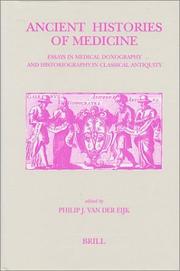
ISBN: 9004105557 9004377476 9789004105553 9789004377479 Year: 1999 Volume: 20 Publisher: Leiden: Brill,
Abstract | Keywords | Export | Availability | Bookmark
 Loading...
Loading...Choose an application
- Reference Manager
- EndNote
- RefWorks (Direct export to RefWorks)
This collection of essays focuses on the ways in which Greek and Latin authors viewed and wrote about the history of medicine in the ancient world. Special attention is given to medical doxography, id est the description of the characteristic doctrines of the great medical authorities of the past. The volume examines the various attitudes to the history of medicine adopted by a wide range of ancient writers (e.g. Aristotle, Galen, Celsus, Herophilus, Soranus, Oribasius, Caelius Aurelianus). It discusses the historical sense of ancient medicine, the variety of versions of the medical past that were created and the wide range of purposes and strategies which medico-historical writing served. It also deals with the question of the sources, the role of historiographical traditions and the variety of literary genres of ancient medico-historical writing.
Medicine, Greek and Roman --- Authors, Greek. --- Authors, Latin. --- Historiography. --- Authors, Roman --- Latin authors --- Roman authors --- Greek authors --- Greek medicine --- Medicine, Roman --- Medicine, Unani --- Roman medicine --- Tibb (Medicine) --- Unani medicine --- Unani-Tibb (Medicine) --- Medicine, Ancient --- Medicine, Greek and Roman - Historiography.
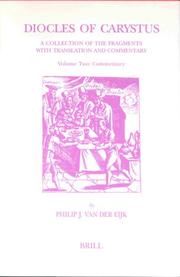
ISBN: 9004120122 9004102655 9004120130 9004377506 9004377492 9789004120136 9789004120129 9789004102651 Year: 2001 Volume: 22, 23 Publisher: Leiden: Brill,
Abstract | Keywords | Export | Availability | Bookmark
 Loading...
Loading...Choose an application
- Reference Manager
- EndNote
- RefWorks (Direct export to RefWorks)
Diocles of Carystus (4th century BCE), also known as 'the younger Hippocrates', was one of the most prominent medical authorities in antiquity. He wrote extensively on a wide range of areas such as anatomy, physiology, pathology, therapeutics, embryology, gynaecology, dietetics, foods and poisons. In his writings, he betrays strong philosophical influence, and his views present striking connections with the Hippocratic Corpus, Plato, Aristotle and Theophrastus. The study of Diocles' ideas has long been hampered by the absence of a reliable collection of the remaining evidence. This book presents and discusses all the fragments and testimonies to Diocles' views. The first volume presents the Greek, Latin and Arabic sources with facing English translation. The second volume (publication April 2001) provides a commentary on the fragments and places them in their intellectual context.
Geneeskunde [Griekse ] --- Geneeskunde [Griekse en Romeinse ] --- Geneeskunde [Romeinse ] --- Greek and Roman medicine --- Griekse en Romeinse geneeskunde --- Medicine [Greek ] --- Medicine [Greek and Roman ] --- Medicine [Roman ] --- Médecine grecque --- Médecine romaine --- Diocles, --- Greek medicine --- Medicine, Roman --- Roman medicine --- Medicine, Ancient --- Diocles of Carystus --- Macroscopic, incl. comparative --- Greek-roman --- 460bc-576ad --- Macroscopic, incl. comparative. --- 460bc-576ad. --- Medicine, Greek and Roman --- Medicine, Unani --- Tibb (Medicine) --- Unani medicine --- Unani-Tibb (Medicine) --- Anatomy --- Embryology. --- History of medicine --- Medicine, Greek and Roman. --- Obstetrics. --- Physiology. --- Médecine grecque et romaine --- Diocles, - of Carystus. --- Diocles, - of Carystus
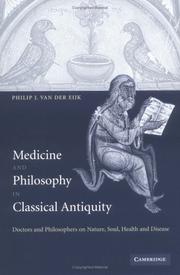
ISBN: 9780521142977 0521142970 9780521818001 9780511482670 0521818001 Year: 2006 Publisher: Cambridge: Cambridge university press,
Abstract | Keywords | Export | Availability | Bookmark
 Loading...
Loading...Choose an application
- Reference Manager
- EndNote
- RefWorks (Direct export to RefWorks)
Medicine, Greek and Roman. --- Medicine --- Soul. --- Nature. --- Médecine grecque et romaine --- Médecine --- Ame --- Nature --- Philosophy. --- Philosophie --- Medicine, Ancient. --- Medicine, Ancient --- Medicine, Greek and Roman --- Soul --- Philosophy --- Medicine [Greek and Roman ] --- Medicine [Ancient ]

ISBN: 9780801444968 Year: 2006 Publisher: Ithaca, N.Y. Cornell University Press
Abstract | Keywords | Export | Availability | Bookmark
 Loading...
Loading...Choose an application
- Reference Manager
- EndNote
- RefWorks (Direct export to RefWorks)
Book
Year: 2006 Publisher: Ithaca, N.Y. Cornell University Press
Abstract | Keywords | Export | Availability | Bookmark
 Loading...
Loading...Choose an application
- Reference Manager
- EndNote
- RefWorks (Direct export to RefWorks)
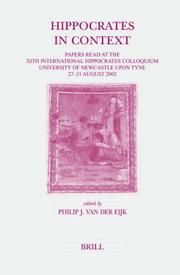
ISBN: 9004144307 9789004144309 9781429453356 1429453354 9781433704444 1433704447 9004377271 1280868236 9786610868230 9047407687 9789004377271 Year: 2005 Volume: 31 Publisher: Leiden: Brill,
Abstract | Keywords | Export | Availability | Bookmark
 Loading...
Loading...Choose an application
- Reference Manager
- EndNote
- RefWorks (Direct export to RefWorks)
This collection of papers studies the Hippocratic writings in their relationship to the intellectual, social, cultural and literary context in which they were written. ‘Context’ includes not only the Greek world, but also the medical thought and practice of other civilisations in the Mediterranean, such as Babylonian and Egyptian medicine. A further point of interest are the relations between the Hippocratic writings and ‘non-Hippocratic’ medical authors of the fifth and fourth century BCE, such as Diocles of Carystus, Praxagoras of Cos, as well as Plato, Aristotle and Theophrastus. The collection further includes studies of some of the less well-known works in the Hippocratic Corpus, such as Internal Affections , On the Eye , and Prorrheticon . And finally, a number of papers are devoted to the impact and reception of Hippocratic thought in later antiquity and the early modern period.
Medicine, Greek and Roman --- History of Medicine --- Philosophy, Medical --- History, Ancient --- History --- Hippocrates --- Medicine [Greek and Roman ] --- Congresses --- History [Ancient ] --- Medicine --- Philosophy --- Medicine, Greek and Roman. --- Greek medicine --- Medicine, Roman --- Medicine, Unani --- Roman medicine --- Tibb (Medicine) --- Unani medicine --- Unani-Tibb (Medicine) --- Medicine, Ancient --- History. --- Hippocrates. --- Hippokrates --- Hippocrate --- Abuqrā --- Hipócrates --- Hippocrates, --- Ipoḳrat --- Ippocrate --- Ypocras --- Abuqrāṭ --- היפוקראטס --- بقراط --- Medicine, Greek and Roman - History --- Medicine, Greek and Roman - Congresses --- History of Medicine - congresses --- Philosophy, Medical - congresses --- History, Ancient - Congresses
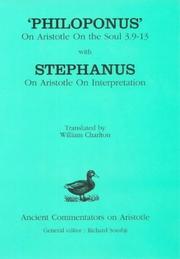
ISBN: 9781472558503 9780715628980 9781472501912 1472557786 1472558502 0715628976 9780715633069 9781472558497 9781472557780 9780715633052 9781472557766 0715633058 9780715632352 9780715633076 9780715628973 9781472557773 0715632353 0715633074 147255776X 1472558499 0715633066 1472557778 1472557727 9781472557728 9781472501172 1472501179 Year: 2014 Publisher: London: Bloomsbury,
Abstract | Keywords | Export | Availability | Bookmark
 Loading...
Loading...Choose an application
- Reference Manager
- EndNote
- RefWorks (Direct export to RefWorks)
The ancient Greek commentators on Aristotle constitute a large body of Greek philosophical writings, not previously translated into European languages. This volume includes notes and indexes and forms part of a series to fill this gap.
Déterminisme (philosophie) --- Âme --- Aristote, --- Soul --- Aristotle. --- Âme. --- Aristote --- Perception (Philosophy) --- Sense (Philosophy) --- Philosophy, Ancient --- Psychology --- Aristotle --- Philosophy, Ancient. --- Psychology. --- Soul. --- De anima (Aristotle). --- Ziel. --- History. --- Psychologie. --- Seele. --- Aristoteles, --- Psychologie --- Ame --- Early works to 1800 --- Ouvrages avant 1850 --- Ouvrages avant 1800 --- Sensibilité (Philosophie) --- Intellect --- Intelligence
| Listing 1 - 7 of 7 |
Sort by
|

 Search
Search Feedback
Feedback About UniCat
About UniCat  Help
Help News
News